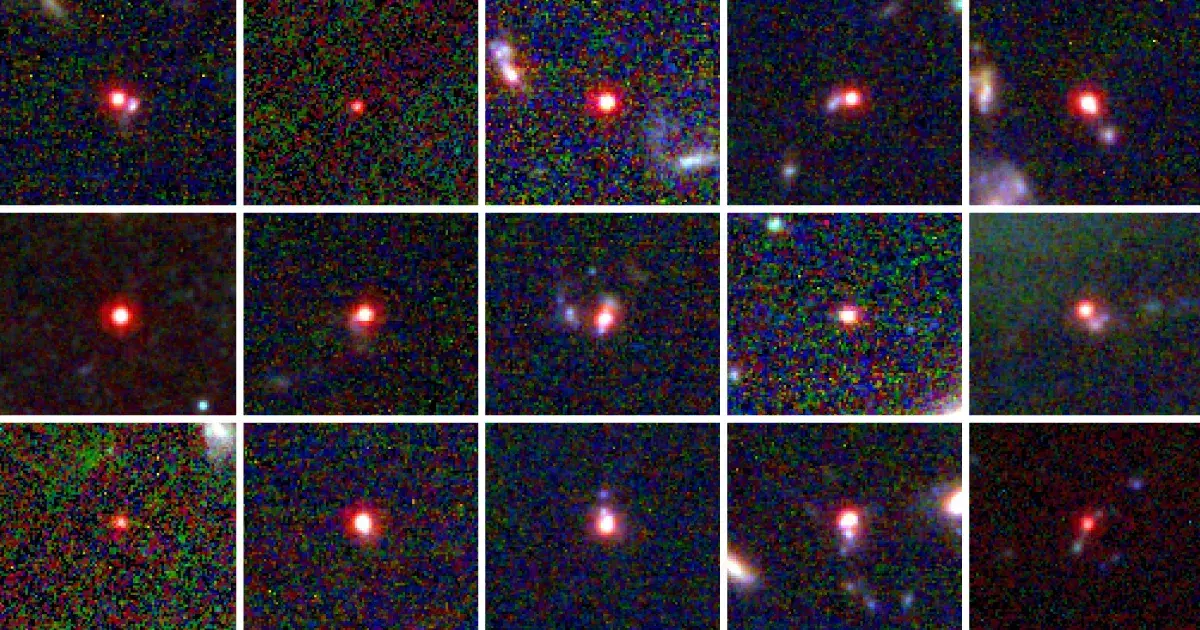Observations from the James Webb Space Telescope have revealed a surprising number of young galaxies containing massive black holes at their centers, churning up the gas within only a few hundred million years after the Big Bang. Spectroscopic data indicates that these “hidden little monsters” harbor black holes weighing millions of solar masses. The abundance of growing baby black holes challenges theories about how supermassive black holes could have formed so early in the universe’s history. While astrophysicists expected JWST to find some early black holes, the sheer number uncovered has shocked astronomers and could rewrite models of galaxy and black hole formation. If confirmed, these observations suggest that massive black holes may have grown much faster than previously believed possible in the infant universe.

I do believe there is a strong link to be understood between what is observed in this post and what was posted :
X-Ray echo suggests our galaxy was “active” (quasar-like) just 200 years ago - Nature
by @CanadaPlus one month ago.
Thanks for this (X-Ray echo) post and for the last comment you made here in the other thread, about Penroses’ current work.So I will read through some of this and try to come back with something worthwhile to say.
Update : I read some more and most of that is just out of my reach. The only paragraph I kind of understand somewhat is this :
(…) conformal cyclic cosmology (CCC) theory.[67] In this theory, Penrose postulates that at the end of the universe all matter is eventually contained within black holes which subsequently evaporate via Hawking radiation. At this point, everything contained within the universe consists of photons which “experience” neither time nor space. There is essentially no difference between an infinitely large universe consisting only of photons and an infinitely small universe consisting only of photons. Therefore, a singularity for a Big Bang and an infinitely expanded universe are equivalent. [68]
…and now I need some rest.

With all sincerity and seriousness …
… kay
What’s the implication then of Penrose’s idea? That no matter the trajectory of a universe some sort of “big bang” singularity is inevitable, or at least is so for many more trajectories than previously thought.

I read through these and try to understand them but mostly I don’t like those theories, because (in part) more and more there are disparities between them and observations.
So I came up with some ideas myself, one of which I wrote in here :
“New physical cosmological model : is it coherent ?”But it may take a few years or a few thousand before we have a good cosmology.

Does anyone know why exactly we’ve ruled out these being primordial?

Cosmic microwave background (CMB) is very smooth ; if there was black holes in there I guess we would see (huge) unevenness.
Hummm, or at least, that stupid LCDM would lead to such an expectation. … that model also put CMB at :
400 000 to 500 000 years after the BBang.
and most distant visible galaxies (and black holes) at :
330 000 000 years after BB.if we go by this number we have a few hundred million years to produce such big things out of something very smooth.
if we used a different model we could have much more time.

Here’s an interesting adjacent paper. The size of black holes formed is (obviously, in hindsight) limited by the cosmological horizon in a standard big bang model, so they would have to form late. Late enough to conflict with CMB measurements, and the authors have to introduce a weird distribution of spacial curvature to compensate.
Yeah, LCDM isn’t looking so hot these day. I wonder who’s looked at singularity-free theories that might allow a sizeable black hole to already exist before inflation.

The title of that paper is :
“Supermassive Primordial Black Holes From Inflation”
I have read about inflation since many years and it is viewed increasingly as impossible and falsified.
I don’t work in this field. For me this is just a hobby. Are you a physicist ?
No, I’m not a physicist, but I think you might be mixing the term up with something else (phantom energy maybe?). Inflation is a critical part of the standard big bang cosmology; it’s (thought to be) how things got so smooth in the first place. See the wiki here.

Under this very article you provided you can read, at criticism :
At a conference in 2015, Penrose said :“inflation isn’t falsifiable, it’s falsified. … BICEP did a wonderful service by bringing all the Inflation-ists out of their shell, and giving them a black eye.” (…) Penrose’s shocking conclusion, though, was that obtaining a flat universe without inflation is much more likely than with inflation – “by a factor of 10 to the googol power!”
Please read about this guy :
Roger Penrose (…) mathematician, mathematical physicist, philosopher of science and Nobel Laureate in Physics.
I read much more than the average person about it and my experience & education allows me to know how scientific research works. The fact is, not only inflation but Lambda CDM is dead.
There is a lot more to say about it.

With all due respect to Penrose – who is indisputably brilliant – in probability when you start to say things like, “X is
10^10^100times more likely than Y,” it’s actually much more likely that there’s some flaw in your priors or your model of the system than that such a number is actually reflective of reality.That’s true even for really high probability things. Like if I were to claim that it’s
10^10^100times more likely that the sun will rise tomorrow than that it won’t, then I would have made much too strong a claim. It’s doubly true for things like the physics of the early universe, where we know our current laws are at best an incomplete description.
I think what’s also great with Penrose is that he doesn’t care about money or politics, which are major factors guiding what other physicists will say.
He already proved himself and doesn’t need to argue about pity things. He can even allow himself to make some jokes about10^(10^100)or talk seriously about it… I wouldn’t know.
Finally, if I add the immense chance of talking to him this wouldn’t be my preferred topic.

Penrose is also pretty controversial. I didn’t know he was dead-set against standard cosmology but I’m not surprised.
Most cosmologists still assumed it up until JWST started throwing spanners into the works. Notice the tone the Wiki article takes, it uses words like “believed” instead of “proposes”. I’m curious what Penrose prefers.
Edit: It looks like he prefers his own Weyl curvature hypothesis, which I’ll have to read up on. This is his subfield so he gets to have big ideas.

I like what you say. So, in a few minutes I will make a new root comment inside this post so you could continue this thread some more with me.

Very interesting. Thanks for sharing.

Wrong expectations from wrong model.
I wonder if RMOND (TeVeS) would be better here than LCDM. Research money is mismanaged.

